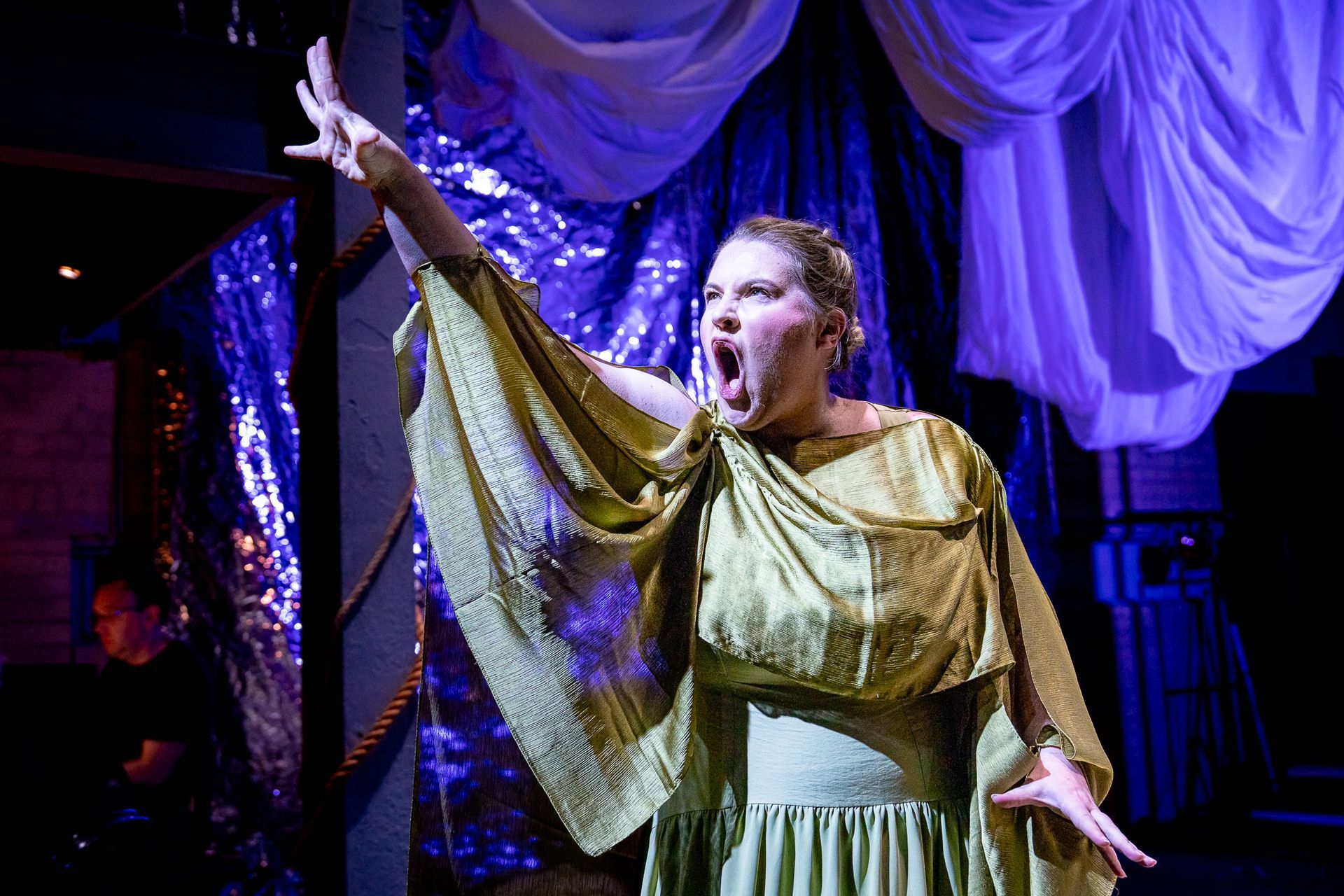Grimeborn Opera Festival: Tristan und Isolde by Richard Wagner at Arcola Theatre

‘Intimate yearning, finely sung’ ★★★★
I always think that watching a Wager opera is like flying to Australia. You know you’ll arrive eventually. In this case we took off at 6pm and finally landed at Sydney airport – or at least at the Liebestod, arguably the most sublime musical expression of love ever written – at 10.15pm. Wagner had no patience with performers or audiences who lack stamina.
Tristan und Isolde, which debuted in 1865, is here sung in German with English subtitles. Wager famously wrote his own libretti, and his words are usually overblown to the point of pomposity. It’s hard, therefore to know how best to translate them without losing the writer’s distinctive voice. And the decisions made here are sometimes clunkily erratic in their literalness. “The yearning that drove me to live anew” and “drove me madly from heart to brain” are risible. On the other hand “That adventure will be such a lark” doesn’t sit right either. It’s a problem which this production doesn’t quite solve.
It’s fascinating to see a grand (in every sense) opera reworked in chamber form. Michael Thrift’s interesting version of the score is arranged for string quartet with piano, occasionally joined by three off-stage wind players. They sit, cramped under a corner balcony, which occasionally features in the action. And full marks to every one of them. It was drippingly hot in Arcola’s Studio 1 when I saw this show and yet, slippery fingers notwithstanding, these fine musicians delivered every nuance with aplomb and rarely an infelicitous note or corner.
Wagner more or less invented the leitmotiv: a recurrently used musical phrase or motif to represent a character or idea. Here the overture opens with the series of evocative unresolved chords which we hear many times over the next 255 minutes. They remind us that the love between Tristan and Isolde will always be troubled until the very end when they’re united in death. Thrift’s arrangement ensures that we both hear and notice them.
Guido Martin-Brandis makes good directorial use of the space which has seating on three sides and three entry points. No one is far from the performers so the piece – usually mounted on a huge scale suddenly becomes very intimate. That’s a challenge for actors but these seven performers rise to it with aplomb.
I often think that this opera should be called Isolde und Tristan but, of course, that’s not the way Wagner operated although Isolde is definitely the lead. Becca Marriott is listed as “cover Isolde” and sings only one of the three performances but she is astonishingly good. She has a rich voice with a wide range of colour from vibrato low notes to penetrative golden soprano ones which take the listener by surprise. Moreover, her face is unusually expressive and she knows exactly how to use it, especially in Act 2 when she and her Tristan (Brian Smith Walters – good) are caught in flagrante. She is a fine actor.
Other pleasing performances include Simon Wilding whose chocolate brown bass voice finds all the hurt, disappointment, wisdom and gravitas that Konig Marke needs when he discovers that Isolde is not for him after all. And Laureen Easton delights as Isolde’s common-sensible but devious servant/companion, Brangane.
It’s not always easy to take the love potion (an operatic precursor to viagara?) plot seriously because it crops up more often in comic romps such as Donizetti’s L’elisir d’amore or Gilbert and Sullivan’s The Sorcerer. But you have to meet Wagner on his own terms. Tristan und Isolde is a deadly earnest exploration of the psychology of attraction. If Wagner knew any jokes he kept them to himself. Tristan is meant to be ferrying Isolde to Cornwall to marry his uncle, Konig Marke. But there’s history between them. And when Brangwane substitutes an aphrodisiac for the poison Isolde and Tristan think they’re drinking in a suicide pact, they give vent to their hitherto suppressed yearning. The tenderness they then find is nicely done in this production – especially in the “Night of Love” duet which they start back-to-back with fingers interlaced and the audience can almost feel the erotic quivering of their muscles. Incidentally, this was sung in such a way that it sounded as if it was written at least 50 years later by, say, Richard Strauss but was none the worse for that.
Caitlin Abbot’s set and Davy Cunningham’s lighting help to build atmosphere. Crumpled foil, gauzy white drapes which become bandages and a model boat are often flushed passionate red and it’s pleasingly supportive of the action.
Photography: Steve Gregson
Tristan und Isolde by Richard Wagner at Arcola Theatre
Shatter Brain/Regents Opera
MD/Arranger: Michael Thrift
Director: Guido Martin-Brandis
Grimeborn Festival of reworked Operas runs 16 August – 13 September at Arcola Theatre
https://www.arcolatheatre.com/whats-on/
This review was first published by London Pub Theatres Magazine: https://www.londonpubtheatres.com/grimeborn-opera-festival-tristan-und-isolde-by-richard-wagner-at-arcola-theatre